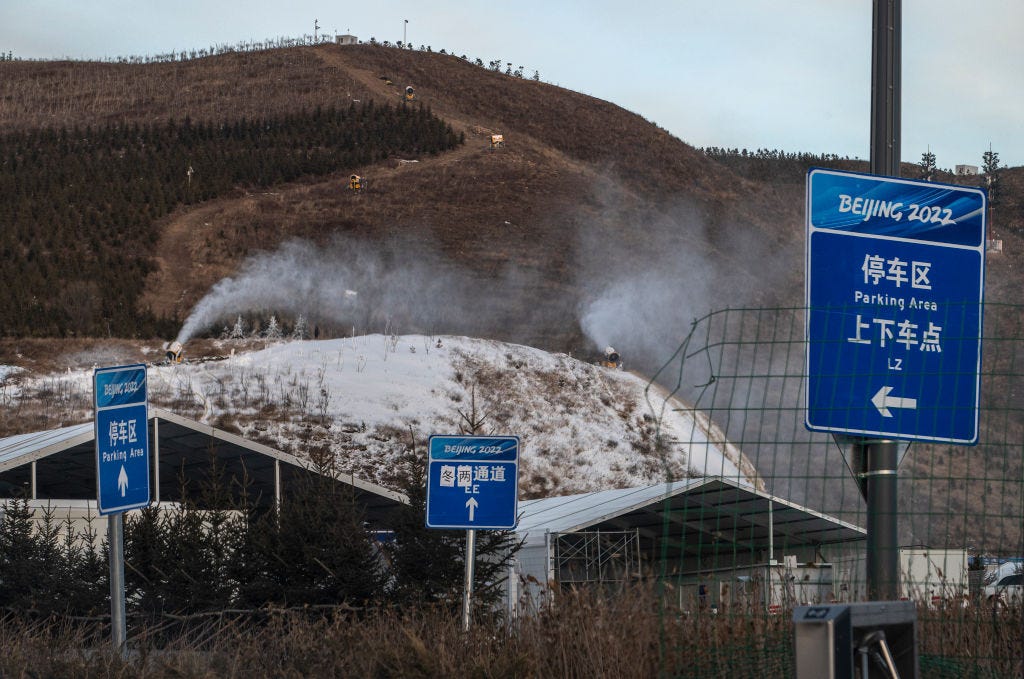🌱 The Grumpy Optimists #48
How green are the winter olympics?
Happy Monday 👋
As the Winter Olympics head into their final week, we’re looking into the green credentials of the 2022 Games, which may not be as green in a region of China without snow.
We’re also looking at the major breakthrough in nuclear fusion, how to join a community garden and a quick video on the impact of electric cars. Let us know what you think below and have a great week 👇
Beijing 2022 - The Green Winter Olympics?
The Winter Olympics are underway in Beijing, but in quite unusual circumstances, there’s a severe lack of snow and a fair amount of questions about the green credentials of the Olympics that required 20,000 trees to be felled in order to take place. We wanted to dig into the facts and try to separate the grumpy from the optimistic. Let’s start with the lack of snow.
💦 Water
Beijing isn’t the first Olympic games to feature fake snow. Sochi in 2014 relied on 80% fake snow, with Pyeongchang in 2018 closer to 90%. This year, however, is unprecedented - the first Olympics to rely on 100% fake snow, taking place in a region with little precipitation. Creating so much snow is no mean feat, relying on seven machine rooms and pumping stations to move water up mountains where it is pushed through high-pressure pumps and blasted through 350 snow machines.

This requires 49 million gallons of water - enough to fill 800 Olympic swimming pools and 4% of the water available in Yanqing. This has the potential to cause problems in a region that is already experiencing water stress. Chinese officials have said the water has come from dedicated reservoirs that have been built up over the last few years, but local newspapers are suggesting that water is being siphoned off for the games and some irrigation for farmland has been turned off.
There are also questions about what will happen to the water once it melts, and how it will impact a typically dry region. There are a lot of unknowns, but the organisers are suggesting they will be able to recapture most of the water, something that seems highly unlikely and adds another strike against the green credentials.
Snow machines are not a new phenomenon and are used widely around the world as the skiing season is cut short by a warming planet. So for those that may complain whilst also skiing in the Alps this winter, you can’t say too much here, sorry.
🔋 Energy
The snow machines and the Olympic games also require a lot of energy. To combat the energy use and to showcase China’s climate ambition, the games aim to be powered by 100% renewable energy from Zhangjiakou, the mountain city in China’s Hebei province that is hosting the skiing events of the games. The region has renewable capacity exceeding that of most other countries.
China is also pioneering its new ‘Green Electric Grid’ to deliver renewable energy for the games. You may be thinking this seems a bit boring, and why does it matter? Well, the new grid is fairly groundbreaking, using a direct current (DC) system, rather than a traditional alternating current (AC) system. Importantly, this makes it much easier for renewables to be transported across long distances and will be part of a $300 billion plan to help electrify China. Previously it was hard to transport renewable energy over long distances, whereas fossil fuels can easily be transported as a liquid, gas, or solid.
This Olympics could then be seen as a catalyst for new technology adoption and accelerating renewable infrastructure. However, the question remains, is the Olympics really green or just a display of climate showmanship while China continues to build coal power plants?
🤔 Final Verdict
This is genuinely a tough one. Before we did this research, you’d think any event that requires snow, yet takes place in an area that has none of it, screams stupidity and unsustainable. However, there are a number of (somewhat) positives, mainly around the acceleration of breakthrough energy systems. Could you argue that the Olympics is just a use case for an energy breakthrough that would have happened regardless? Probably.
Despite the renewable energy developments, the games are not quite getting the green stamp of approval from us. It’s hard to endorse any event as ‘green’ when it relies on mass tree cutting alongside incredibly energy and water-intensive fake snow.
👀 Articles to read
⚡Major nuclear fusion breakthrough. The UK-based JET laboratory smashed its own world record for the amount of energy it produced from nuclear fusion. This is a crucial breakthrough, but the amount of energy produced by the experiment is only enough to boil 60 kettles worth of water. Fusion energy is not expected to be the solution for net zero by 2050 but could come into play after that date.
🌷 Community gardens ‘revolutionary in a quiet way’. One of the best ways to feel more optimistic about the future of the planet is to reconnect with nature, and what better way to do that than to join a community garden? Plenty of groups are popping up all over the UK and abroad, and you can learn to grow your own food and be part of the garden revolution. Find a local group here.
🌊 More than 100 nations take action to save the oceans. The One Ocean Summit was hosted last week, and representatives from across the world have committed to measures aimed at protecting the oceans from human harm, including the fight against illegal fishing, plastic pollution, and protection of international waters.
📹 A video to watch
Transportation accounts for close to 1/5th of global GHG emissions and electric vehicles are hailed as one of the best solutions to climate change. Fair comment, right? This video raises an interesting point - in order to meet the growing demand for EV’s, lithium production (one of the components of batteries) will also have to increase. At the moment, lithium is produced in few places around the world and is often produced at the expense of the environment and the local community. These lithium mines have impacts on the ecosystem and can risk leaching chemicals into the local water supply.
The question asked here is - is it worth sacrificing wildlife and communities to gain traction in reducing our greenhouse gas emissions and meeting climate goals? Is slowing the issue of climate change on a global level, worth accelerating it on a local level? Who wins and who loses?
🎙️ A podcast to check out
This episode by the Guardian’s ‘The Long Read’ looks at the havoc that climate change is wreaking on insect populations, which in turn is destabilising the complex and sophisticated relationships that our ecosystems rely on.
For example, the Arctic bumblebee’s warm fuzz is not adapted to the soaring temperatures we’re now seeing in the Arctic. Meanwhile, UK bees are coming out earlier due to climate change causing temperatures to rise earlier in the year - known as a phenological shift. Our flowers, however, aren’t blooming earlier to match their arrival, as the day lengths stay the same. This new misalignment of timing leaves the bees without food and the flowers unpollinated. It’s sobering stuff. You can find the text version of this article here.
That’s all from us this week folks. Stay healthy and optimistic.
The Grumpy Optimists 💚



